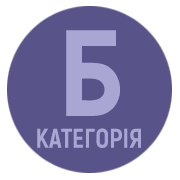LEXICAL AND SEMANTIC CHARACTERISTICS OF THE TERMINOLOGY OF ACADEMIC INTEGRITY IN THE ENGLISH SCIENTIFIC DISCOURSE
DOI:
https://doi.org/10.32782/philspu/2023.3.13Keywords:
academic integrity, English scientific discourse, terminology, thematic group, lexical and semantic features, ways of word formationAbstract
The article deals with lexical and semantic features of the terminology of academic integrity in the English scientific discourse. The concept of the English scientific discourse is defined, as an expression of the semantic unity of content-regulated speech, represented in English and limited by the social functions and powers of the participants of the situation within the scientific style; six thematic groups of terms denoting academic integrity in the English scientific discourse are identified. They are “principles of learning”, “observance of academic integrity when working with sources”, “manifestations of academic dishonesty”, “violators of academic integrity”, “scientists and representatives of educational centres”, “educational space”. The article analyses the peculiarities of word formation and identifies the semantic characteristics of the terminology of academic integrity in the English scientific discourse on the basis of English manuals, reference books, scientific articles on academic integrity. The word-formation analysis has revealed that the construction of terms denoting academic integrity in the English scientific discourse is provided by morphological and syntactic methods. The following kinds of morphological word formation were found out to be typical of this terminology: prefixes, suffixes, conversion and compounds. The most productive way of word formation of the academic integrity terminology in the English scientific discourse is the suffixal one which is presented within the following thematic groups “principles of education”, “observance of academic integrity when working with sources”, “manifestations of academic dishonesty”, “violators of academic integrity”, “scientists and representatives of educational centers”. In the terminology of academic integrity in the English scientific discourse, lexical and semantic processes of polysemy, synonymy, homonymy, antonymy and paronymy have been identified and analysed. Synonymy has been identified as the most common lexical and semantic process implemented in the terminology of academic integrity.
References
Академічна доброчесність: виклики сучасності. Збірник наукових есе учасників наукового стажування для освітян. Варшава, 2018. 162 с.
Академічна доброчесність: проблеми дотримання та пріоритети поширення серед молодих вчених : кол. моногр. Дніпро, 2017. 169 с.
Ільченко О.М. Етикетизація англо-американського наукового дискурсу : автореф. дис... д-ра філол. наук. Київ, 2002. 37 с.
Rusko T. Lexical Features of scientific discourse. Philology, Educology. 2014. № 22(1). P. 82–88.
Roth W. M. Telling in purposeful Activity and the emergence of Scientific Language. Establishing scientific classroom discourse communities: multiple voices of teaching and learning research. New-York, 2005. P. 45–71.
Гніздечко О.М. Авторизація наукового дискурсу: комунікативно прагматичний аспект (на матеріалі англомовних статей сучасних європейських та американських лінгвістів) : дис. … канд. філол. наук. Київ, 2005. 20 с.
Flottum K. Language and Discipline Perspectives on Academic Discourse. Newcastle, 2007. 279 p.
Chafe W. Discourse, consciousness, and time. The flow and displacement of conscious experience in speaking and writing. Chicago, 1994. 317 p.
Pavel S., Nolet D. Handbook of terminology. Quebec, 2001. 172 p.
McCabe D. L. Cheating among College and University Students: A North American Perspective. International Journal for Educational Integrity. 2005. 11 p.
Riemer N. Cognitive Linguistics Research. The Semantics of Polysemy: Reading Meaning in English and Warlpiri. Berlin, 2005. 487 p.
Richards J. C., Schmidt R. Longman Dictionary of Language Teaching and Applied Linguistics. Essex, 2002. 654 p.







